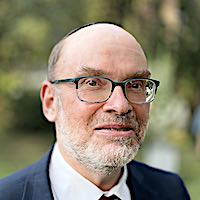Bet Hakenesset Stenecourt, Manchester
ויחר אף ה’ במשה ויאמר הלא אהרן אחיך הלוי ידעתי כי דבר ידבר הוא וגם הנה הוא יצא לקראתך וראך ושמח בלבו. “And the anger of H. burned against Moshe and said: Is not Aharon the Levi your brother? I know that he will surely speak (well to Pharaoh). And also, behold, he comes forth to meet You. And when he sees You, he will be glad in his heart” (Ex. 4,14).

The Gemara Zevachim 102a discusses the question why Moshe Rabbenu served as Kohen Gadol only for seven days, the shiv’at yemey ha-milluim, and then his brother Aharon took the position over. R. Shim’on bar Yochay claims that Moshe was thus punished for having refused to accept the mission to go to Pharaoh. It was a result of the anger of H. against him. A textual evidence is that in the same verse Aharon is still called Levi and not Kohen. “I said that You (Moshe) were to be the Kohen and he (Aharon) was to be the Levi. Now that You aroused my anger, he shall be the Kohen and You shall be the Levi”.
R. Yehoshua’ ben Qorchah and Chakhamim think otherwise. In their opinion H. had already decided that Moshe should be given a different role from the very beginning. He made the Mishkan and had the right to inaugurate it. But the civil power which Moshe embodied had to be kept separate and distinct from the religious one. The anger of H. didn’t have any consequence in their interpretation. The question is how do they read the above verse according to their view. Is there to be found any hint to the fact that Moshe has been granted a different status, namely a kind of sovereignty over the people of Israel?
The Gemara goes on to discuss a different “burning anger” which concerned Moshe himself toward Pharaoh. ויצא מעם פרעה בחרי אף“And he (Moshe) left Pharaoh’s presence in a burning anger” (Ex. 11,8). Apparently Moshe did not say anything at all to Pharaoh as a result of his anger. The Gemara explains that Moshe had been instructed to do so by H. Himself. ונצבת לקראתו על שפת היאר“You (Moshe) shall stand in front of Pharaoh to meet him (liqrato) at the river’s bank (Ex. 7,15). One of the explanations given is: “Pharaoh is a king, give him respect”.
We are taught that going liqrat (“to meet”) or standing liqrat means kevod ha-malkhut, “dignity of the royalty”. The same expression liqratekha occurs in our verse as well. This is the hint. Aharon recognizes in his brother a sovereign! Although Aharon had been already appointed a Kohen Gadol (in this view) he is still referred to as Levi in its literal sense: companion, partner. Like Ya’aqov had granted royal respect bowing to Yossef although the latter was his son, so Aharon accepted Moshe’s kingship although the latter was younger.
A Mishnah (Midot 1,3) reports that upon Sha’ar ha-Mizrach, the Eastern Gate of the Beit ha-Miqdash, it was drawn an image of Shushan ha-Birah, the capital of Persia. The Gemara (Menachot 98a) gives two different explanations: 1) “So that we would bear in mind from where we came” and give appropriate thanks to the king of Persia, who freed us from there. For it was Cyrus who allowed the Jews to return to Eretz Israel and rebuild the Temple. 2) “So that the awe of the Persian royalty would be upon us”. To royalty we are expected to respond with loyalty.
We learn kevod ha-Malkhut from Moshe’s attitude toward Pharaoh. Why did even such a wicked ruler as Pharaoh deserve to be honored? Maharsha quotes the statement of our Sages in Berakhot 58a that malkhuta de-ar’a’ ke-‘eyn malkhuta’ di-rqi’a’, “earthly government is a reflection of Heavenly rule”. One who shows a lack of respect for a king below is therefore guilty of a lack of respect for the King above. It is a great pleasure and honor for myself and my family to visit England and be Your guests. English population and English Jewry distinguish themselves for the proper dignity they accord to the Royal house and the State. It is not only a matter of long time tradition: it is much more than that. It is an example of civilization we admire. Respect for institutions is a guarantee of stability, democracy, freedom and success. Something which fills us with authentic simchat lev, “joy of the heart”. יישר כחכם
